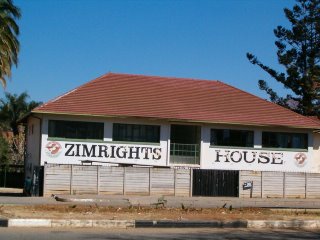Part Five: August 10-12
My first interview in Harare is with Matthew Takaona, the President of the Zimbabwe Union of Journalists. Matthew was fired from his job as news editor of the Sunday Mail in 2004 for appealing personally to President Mugabe to reverse the decision to shut down the Daily News on Sunday. He recounts the sad tale of the destruction of Zimbabwe’s free press over the last six years and the mass exodus of experienced journalists from the country and out of the industry; fired, bullied and intimidated into submission by the Mugabe regime. Over three million people have now left Zimbabwe to escape Mugabe’s reign of terror.
In the afternoon I meet the Director of Zim Rights, Dzikamai Machingura and the next morning I meet with the Zimbabwe Lawyers for Human Rights team and interview Otto Saki, a human rights lawyer and member of the Zim Lawyers Secreteriat. I am slightly in awe of both men. They are both young, Dzikamai is 30, Otto, 25 and their abundant clear headedness, self-assurance, determination and bravery in the face of one of the most brutal oppressive regimes in the world is impressive. I am proud to be part of an organisation that is supporting them but I feel the scale of their task is much more than daunting and feel angry that the international community and NGOs are not doing enough to help. I also think if I was in their shoes, I would have run in fear from the country years ago.
On Friday night, our last night in Zimbabwe, we properly unwind for the first time in two weeks. We meet up with the guys from KFM, a Zimbabwean firm that offer financial and accounting advice and are working with Trócaire’s partners in Malawi and Zimbabwe. For a change, we don’t talk about work but we do talk about the Zimbabwe economy. And with Daniel, Raanga, Kutsai, Zed and Gabriel we break the two bottles of beer limit we’ve been holding to till now and have a bit of fun.
On Saturday morning, just as I am about to get in the Taxi with the Professor, ten policemen circle me on their bikes. I am it would appear to have the privilege of being part of the great Zim Dollars hunt that is sweeping the nation. An operation that the Police are using as an excuse to steal money from Zimbabweans left, right and centre. From across the road, Niall sees what’s going on, but in fairness to him, he does not do a runner. He does however deposit his laptop with the hotel staff just in case Zimbabwe’s finest happen to be after us for supporting human rights groups. For about twenty minutes, we have our bags searched thoroughly for Zim dollars. Luckily we have none – we spent them in the bar last night. We do have a few hundred US dollars between us though and we are told that we should have declared them with the Reserve Bank of Zimbabwe. When we repeat that we have a flight to catch in over an hour we are told we will not be able to leave the country today. We are asked to count our money, and several police officers take turns handling it.
Bizarrely, after a while, they back off and their leader tells us he will let us go on but is certain we will be stopped at another roadblock on the way to the airport. The Professor, thankfully knows where one of the roadblocks is and avoids it. We are lucky to avoid the remaining roadblocks and arrive at the airport in time. As we wait for our plane, I watch Mugabe’s propaganda TV: a youth programme called Wise Up; on it, a group of teenagers discuss the relationship between the concepts of heroism and nationalism and talk of the need to love your country and the need to respect and compensate Zimbabwe’s liberation heroes. I am chilled. I want to get back to my rainy, Irish democracy now and luckily for me, I have that option. Thirty hours later we arrive back in Dublin.



<< Home